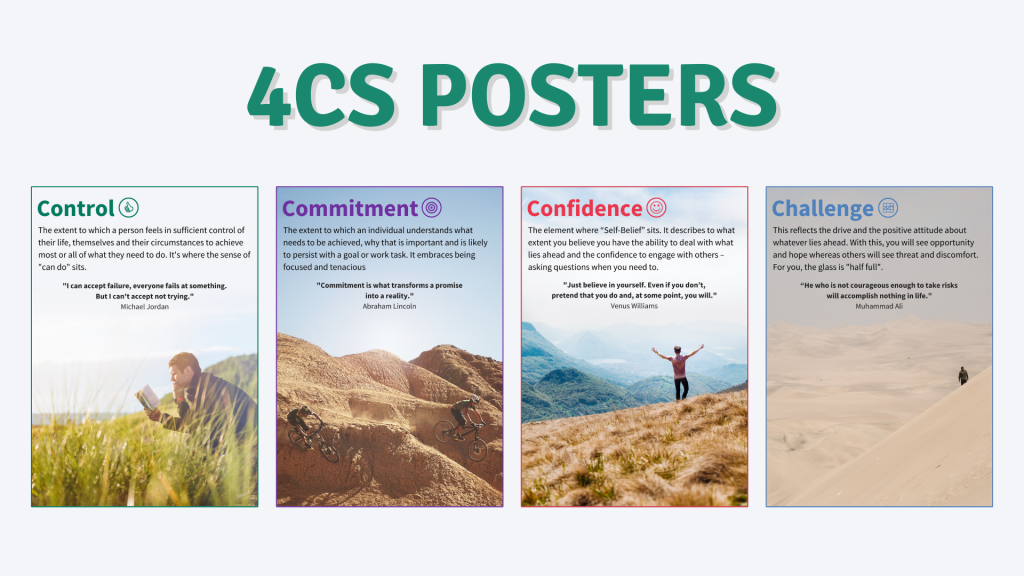WHAT DO WE MEAN BY CONFIDENCE
WHY IS IT IMPORTANT FOR OUR MENTAL RESPONSES
Confidence is the fourth of the 4 constructs of the 4Cs mental toughness concept.
By confidence, we mean self-belief in our toolkit to be able to take to satisfactory conclusion tasks or challenges that others, with less self-belief, may find too hard to do.
It differs from the Control construct in that Control embraces a sense of self-worth – a belief in oneself as a worthwhile person who will “have a go” even if they don’t know how they will do it.
Here we are describing self-belief in possessing a range of abilities (and the preparedness to use them) that will enable the individual to deal with whatever life (or work) throws at them. These could embrace knowledge, skills, experience as well as ability.
Those embarking on a difficult task can do so knowing that, even if it didn’t go to plan, they have enough in their toolkit to be able to deal with that and not be derailed.
As part of this concept we now understand that this construct consisted of two independent but related factors:
Confidence in Abilities
This describes the extent to which the individual has self-belief in their knowledge, skills and experience to be able to achieve what they need to achieve and will be sufficiently confident to use them.
This is an important aspect of the explanation for achievement and underachievement. The relationship with abilities is interesting.
In general, most people have abilities. The more mentally tough in terms of Confidence will feel that they have these abilities and will use them. They are also more likely to be confident and motivated to develop new abilities… because they know they will use them.
However, there are many who, though as able as anyone else, can still doubt their abilities. They believe their abilities are insufficient – when they are. They can also believe that others are more able and step aside – when that is not true.
It is central to being the best that you can be, by using all of your abilities.
This is significant across a wide range of settings from the pupil who hesitates to put down answers in an examination to an employee who hesitates to sort out a simple problem that they can easily resolve if ……
Interpersonal Confidence
In a sense, this describes self-belief in a particular set of abilities – the ability to engage with others.
At one time this was thought to describe assertiveness. It embraces that but our understanding, again thanks to working with practitioners, is now wider.
Interpersonal Confidence describes the preparedness to engage with others to
- Influence them as much as they would influence you
- Engage them and interest them in your tasks and interests
- Learn from others
- Enable your voice to be heard
- To be noticed and acknowledged
and perhaps most importantly
- Ask questions without embarrassment or awkwardness
Understanding these factors helps to explain why two people, who can otherwise be identical in abilities, skills, etc., can respond differently to the same settings. The difference lies in their mindset – their mental approach – towards these settings.
Where Control and Commitment can broadly be seen as elements of Resilience, the Confidence construct, together with Challenge, introduces aspects of positivity.
We might see the world around us as full of complex or challenging tasks which require a range of attributes to be able to handle them well. If we believe we possess these attributes and believe we can use them we can approach those difficult tasks with a degree of confidence that we can deal with them. Particularly so, where the tasks are difficult because they have elements of the unknown because they are tasks from the future.
As with all the mental toughness factors, they are not about describing people in terms of good or bad. They are there to explain responses and enable the individual to be self-aware about why they act the way they do when something happens.
Although it is true that in many settings being more mentally tough on these factors conveys an advantage, it is equally true that the more mentally tough can be disadvantaged at times.
This is why self-awareness about your mental toughness and each factor, normally invisible to you and others, is so important. It brings a new dimension to development that promises to make it more effective.
Those who are more mentally tough when it comes to the Confidence construct, can, without self-awareness;
- Take on too much
- Overestimate their abilities and attempt things they shouldn’t
- Seem to be “know-alls”
- Appear arrogant and can be seen as bullies
- Be dismissive of those who are “not like them”
- Be overly influential, getting their own way when it is not the best option
- Can dominate others to the point of intimidation
- In extremes, be excessively narcissistic.
Those who are more mentally sensitive can bring useful qualities to the team if these are acknowledged. They can;
- Be more realistic about their and others’ abilities
- Be good listeners and take on what others may ignore
- Be very good team members supporting others they see as more knowledgeable and skilled
- Bring a more caring and considerate approach to dealing with people – especially clients and other team members
- Be accommodating to find a solution
- The concept brings a crucial dimension to development. All the factors in mental toughness can be developed. However, research consistently shows that training and development (and coaching) if not customised can be very ineffective and harmful.
Although training can be individualised, it is rarely customised. There is still a tendency for “one size fits all approaches”. Solutions are generally drawn from a tool kit because they have been shown to work. Many do but they don’t all work for all people.
Development is a challenge and an opportunity like any other activity. The individual’s mental response will be significant in their capability to develop. Understanding someone’s mental toughness profile addresses the challenge of customisation.
The Confidence construct can be significant in learning. Studies indicate that when an individual has a lower level of confidence in their abilities and a lower level of engagement with others, this can slow learning. It is often useful therefore to assess this and to attend to any needs to enable an individual to optimise their capacity to develop and grow.
Self-awareness about your mental responses – those invisible responses – really matters.
This and many other aspects are discussed more fully in “Developing Mental Toughness” by Strycharczyk, Clough and Perry. Kogan Page 3rd Edition.
Like the image used in this post on Confidence and the 4Cs? A set of downloadable posters are available here.



